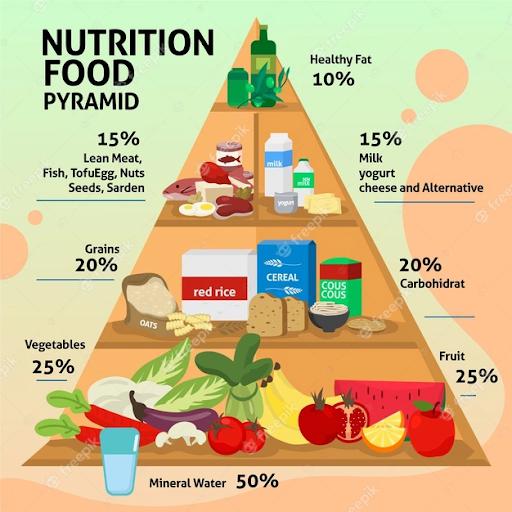BALANCED DIET

There are thousands of diets.Some are for losing weight, while others are for gaining weight,lowering cholesterol,living a healthful life and many other reasons.
A diet is best described as a fixed plan of eating and drinking where the type and amount are planned out in order to achieve weight loss or follow a particular lifestyle.
The most popular diets are: Atkins diet, Zone diet, Ketogenic diet, Vegetarian diet, Vegan diet, Weight Watchers diet, South Beach diet, Raw food diet, Mediterranean diet.
Let's talk about a balanced diet. Balanced diet is a diet that contains an adequate quantity of the nutrients that we require in a day. A balanced diet includes six main nutrients :
Fats, Protein, Carbohydrates, Fibre, Vitamins and Minerals.
About calories.
The number of calories in a food refers to the amount of energy stored in that food. Our body uses these calories from food for walking, thinking, breathing,
and other important functions. The average person needs about 2.000 calories every day for maintain their weight, but the amount depends from age, sex, and physical activity level.
The source of calories is also important. Foods that provide mainly calories and very little nutrition are known as "empty calories". Examples of foods that provide "empty calories":
cakes,cookies, donuts, pizza, chips and fries, ice cream, energy drinks, sodas, processed meat.
According to the Centre for Science in the Public Interest, 4 of the top 10 leading causes of death in the US are directly linked to diet : heart disease, cancer, stroke and type 2 diabetes.
About nutrients:
A healthy diet comprises a combination of different foods. This includes: Staples like cereals (wheat, barley,rye, maize or rice) or starchy tubers or roots (potato,yam,taro).
Legumes (lentils and beans).
Fruit and vegetables.
Food from animal sources ( meat, fish, eggs, milk).
Now some useful information based on WHO recommendations, to follow a healthy diet, and the benefits of doing so.
Breastfeed babies and young children.
A healthy diet starts early in life - breastfeeding fosters healthy growth and may have longer -term health benefits, like reducing the risk of becoming overweight or obese and developing noncommunicable diseases later in life. Feeding babies exclusively with breast milk from birth to 6 months of life is important for a healthy diet. It's also important to introduce a variety of safe and nutritious complementary foods at 6 months of age
Eat plenty of vegetables and fruit.
They are important sources of vitamins, minerals, dietary fibre, plant proteins and antioxidants. People with diets rich in vegetables and fruit have a significantly lower risk of obesity,heart disease,stroke , diabetes and certain types of cancer.
Eat less fats:
Fats and oils and concentrated sources of energy. Eating too much , particularly the wrong kinds of fat, like saturated and industrially-produced trans-fat, can increase the risk of heart disease and stroke.
Using unsaturated vegetable oils (olive, soy, sunflower or corn oil) rather than animal fats or oils high in saturated fats (butter,ghee,lard,coconut and palm oil) will help consume healthy fats.
To avoid unhealthy weight gain, consumption of total fat should not exceed 30% of a person's overall energy intake.
Limit intake of sugars.
For a healthy diet,sugars should represent less than 10% of your energy intake. Reducing even further to under 5%has additional health benefits.
Choosing fresh fruits instead of sweet snacks as cookies,cakes and chocolate helps reduce consumption of sugars.
Limiting intake of soft drinks ,soda and other drinks high in sugars ( fruit juice, cordials and syrups, flavoured milks and yogurt drinks) also helps reduce intake of sugars.
Reduce salt intake:
Keeping your salt intake less than 5h per day helps prevent hypertension and reduces the risk of heart disease and stroke in the adult population.
Limiting the amount of salt and high-sodium condiments( soy sauce and fish sauce ) when preparing foods helps reduce salt intake.
By Dr Olga Sambolska*
 We use cookies on this website to enhance your user experience
We use cookies on this website to enhance your user experience